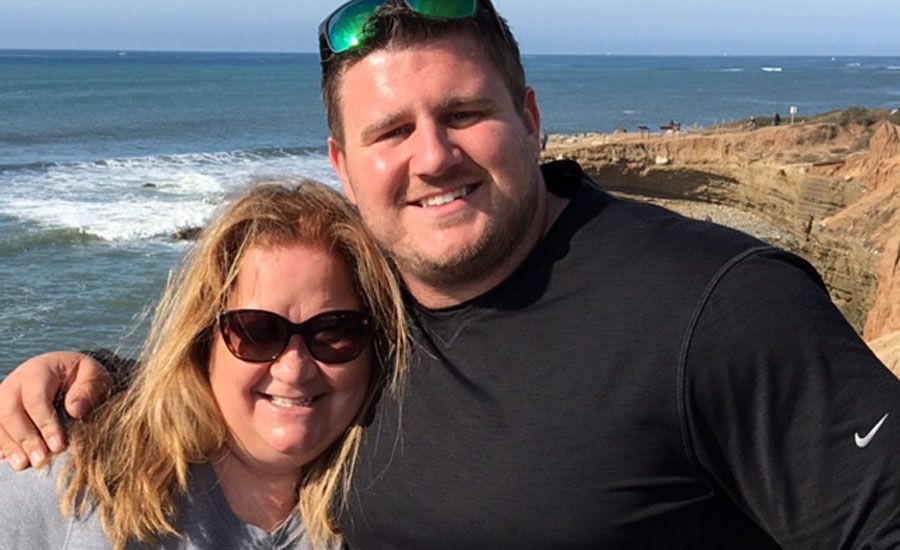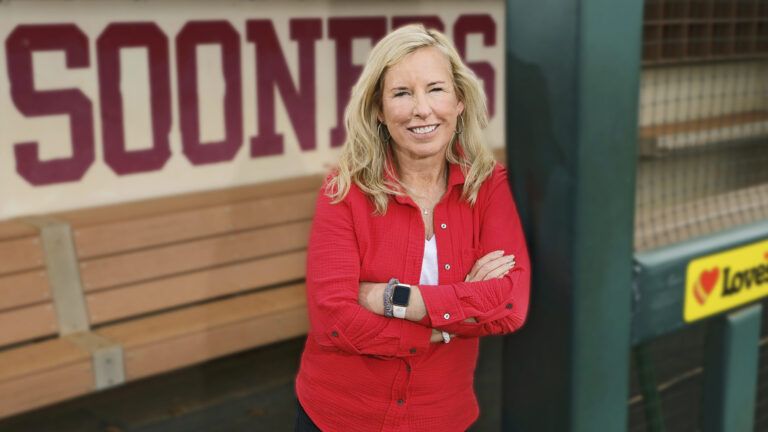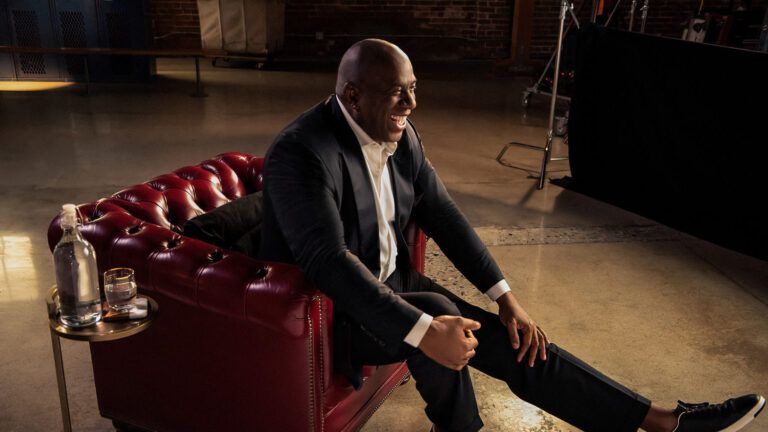Joey sounded so discouraged that April night in 2013. He was calling from the Olympic Training Center in Chula Vista, California, where he spent his days throwing the shot put.
“Mom, I don’t know if this is going to work out,” he said. “I just can’t seem to make all of these changes that Coach wants.”
Joey was 23 years old, six feet tall, 275 pounds, and yet he would always be my baby.
READ MORE: CHRISTEN PRESS REDISCOVERS HER LOVE FOR THE GAME
“Look, you don’t have to do this, Joey,” I said. “You can come home and no one will think less of you. You have options. You can get a job. Move on.”
I paused, taken aback by my own words. I was a coach and a high school physical education teacher. I would never have told one of my students to quit when the going got tough. But part of me wished Joey would come home. We’d never lived this far apart. Even when he was at Penn State University he’d only been two hours away.
Despite my career, for me it was never about my son being an elite athlete. All I ever wanted for Joey was for him to be happy. His dad had died when Joey was only seven. Ever since, it had been just the two of us.
“I’m going to pray about it,” Joey said. He always prayed to discern what was best in any major decision. “I don’t want to do something I’m going to regret.”
I told him I loved him, that I’d be praying too, and we hung up. It was times like this that I missed my husband, Joe. The two of them had been a real team. He’d coached Joey’s church basketball team and his Little League baseball team.
When I was in high school I had played four sports and won 12 district titles throwing discus, shot put and javelin. I loved competing, pushing myself to reach higher and higher goals. But for Joe and Joey I was happy to root from the sidelines.
The spring of 1996, Joe was diagnosed with colon cancer. He died a year later. Just a day after that my mother died of a heart attack. I’d lost my father the summer I graduated from high school. Now it was just Joey and me. Work, church and Joey. That was my life.
READ MORE: SHAKUR STEVENSON READY PUNCH HIS GOLDEN TICKET
Joey needed me to be more than just his mother. I drove him to school. I met him at the bus every afternoon. I helped him with his homework. Of course we went to church together. The first fall after Joe’s death, I joined Joey’s basketball team as an assistant coach. I did it all with a single-minded focus. I didn’t go out with friends. Didn’t take up a hobby. Definitely wasn’t interested in dating. My focus was on raising Joey.
It wasn’t just me doing things for Joey. He tried to fill his father’s void. He mowed the lawn, fixed things around the house. He was always trying to help.
Joey grew like a weed. He had the same strong build Joe and I did. When he enrolled at Bethlehem Catholic High School he was a shoo-in for the football team.
I never missed a game. One day, near the end of the season, Joey said, “Coach thinks I ought to go out for track. You know, like throwing the shot put. He says it will help my footwork on the field.”
“I threw shot in high school,” I said. “If I can help, let me know.”
The first week of track practice I got to the school early to pick him up. Joey and the other track athletes were throwing in the parking lot. The school was too small to have its own track.
I looked on. Joey took the 12-pound shot, reached back and tried to throw it like a baseball. It landed on the asphalt with a thud, not 10 feet away.
I jumped out of the car. “Here,” I said. “Let me show you. You have to know how to hold it.”
I demonstrated, pressing the shot against my neck. “You lean down, with your non-throwing arm pointing down at an angle.” I jumped backward, rotating my hips, my throwing arm rocketing upward like a piston. The shot cleared the parking lot. I’d thrown it at least 25 feet.
“That was amazing,” Joey said, a look of awe on his face.
READ MORE: DAGMARA WOZNIAK’S AMERICAN DREAM
“Getting the release down is critical,” I said. “You have to know when to let go. The power comes from your legs, your hips. Your whole body. Then the release. That’s the key.”
Joey nodded. I handed him the shot and guided him on how to set himself up in the circle and glide to the center, then how to do it all in one smooth motion. He was awkward at first, but by the end of practice he was throwing nearly as far as I had.
“What’s going on here?” I heard a voice say. It was the head coach.
I explained that I’d shown the kids the basics. “Do you think you could coach them?” he asked.
I was happy to. Every afternoon I worked with the throwers. I painted circles in the parking lot, like the ones the kids would have at their meets.
That season Joey’s longest throw was 35 feet. Not great, but a lot better than his first try. With every throw he looked to me for advice. It was something we could talk about, another way to stay close, for me to be there for him.
The next year he threw 46 feet. That summer he went to a throws camp. One of the young instructors there, a guy named Reese Hoffa, offered some advice. “You’re a little on the short side,” he said. “You should try spinning. That will increase your throw.”
Spinning—the rotational technique—wasn’t something I was familiar with. But with the help of another coach, Glenn Thompson, I learned it and we worked on perfecting Joey’s mechanics.
By the end of Joey’s junior year he threw 57 feet! He won the district championship and went on to the state finals. The next year he threw over 60 feet. He was following in my footsteps! How proud was I?
READ MORE: DANELL LEVYA CONTINUING A LEGACY
But at districts he had struggled, more with his confidence than with his physical abilities. He was second-guessing his every move. Although I felt for him as a mom, I knew that that wasn’t what he needed. He needed me to be his coach.
“Joey, stop thinking about it,” I told him. “Relax and just go throw it.” He walked with deliberation toward the circle. I watched carefully. He set up, then purposefully rotated his body with a tremendous, explosive force. The shot took flight, sailing through the air. He threw it 64 feet, 11 inches. A state record!
I watched him at the podium ready to accept his medal. I was bursting with pride. All that work, all that encouragement, had been worth it. I’d devoted myself to Joey, kept him close, tried to always be there for him. Nothing else mattered.
Now, alone in my house in Pennsylvania after his wrenching phone call from California, I relived that moment at the district finals. So much had happened since that day.
Joey had gotten a scholarship to Penn State, where he majored in energy business and finance. He’d gone on to set higher and higher marks. I’d been at every home meet, and a lot of the away matches. Afterward we would always go out for dinner and spend some time together.
“Mom, I love you for all you’ve done for me,” Joey would say, “but shouldn’t you meet new people? Go out with friends? Maybe even date?”
“You are probably right,” I’d tell him. Deep inside, something stirred, and it scared me. Someday I would have to let Joey go. He was a man now and he had his own life to live.
Joey graduated in 2012, having broken Penn State’s shot-put record. That summer he competed in the Olympic trials for a chance to go to London. His farthest throw was 69 feet, 2 inches—just a little too short for him to make the team. In first place was his instructor from that high school throws camp, Reese Hoffa.
Joey was thrilled with his own performance, a personal best. Of course I was there. As he walked off the field a representative from Nike rushed up and offered to sponsor him.
A few months later Joey and I made the trip to California to the Olympic training center together. Art Venegas, a legendary Olympic throws coach, had agreed to train and mentor him. I was excited for Joey. But this phone call? This downheartedness? It had me worried. I couldn’t help him. In fact, I probably shouldn’t help him, I realized. I know he could do this himself. So I did the right thing. I prayed.
READ MORE: HOW BROOKE SWEAT FOUND LOVE ON THE SAND
Lord, you know Joey, better than even I do. Please be with him. Give him the wisdom to make the right choice.
It was days before we talked again. When Joey called, he sounded happier, more like his old self. “After much discernment,” he said, “I feel like this is the right move. Like I was meant to be here. And Mom, I remembered what you told me. To just go do it.”
I smiled. But in his words I heard more than the echo of a former coach. I thought of the first day I’d taught him to throw the shot, how he hadn’t even known how to hold it, when to release. It felt good knowing I’d gotten him to this point, all the work that had gone into it. And now? Clearly we’d made the turn. There was nothing more for me to do. It was time. Time to let go. I was at the release point.
Three years later, Joey and Coach Venegas are definitely clicking. In 2015 Joey won gold in the World Championships with a throw of nearly 72 feet. Now he’s focused on Rio de Janeiro and the 2016 Summer Olympics.
I’ll be in the stands cheering like crazy—the way only a mom can. But I won’t be alone. My new husband, Larry, a sweet, caring man I met in a support group for widows and widowers, will be beside me. As I told Joey a long time ago, it’s all about the release.
Did you enjoy this story? Subscribe to Guideposts magazine.






